Rosacea
Home » Conditions » Rosacea
Get Back Your Confidence
Not sure about your condition? Get in touch now, there is no reason for you to wait.
Award winning dermatology service, with over 20 years of experience
Short waiting lists, on some occasions offering same week appointments
Safe environment, in Care Quality Commission approved facilities
ROSACEA TREATMENT LONDON
Rosacea is a surprisingly common skin condition that affects up to 10% of the population – mostly women between 30 and 60 years old. Unfortunately, left untreated it can worsen over time; however, persistent treatment may be beneficial in managing its symptoms. Though rosacea occurs more frequently among females, men have been found to show much more severe effects when affected by this affliction.
WHAT CAUSES ROSACEA?
Rosacea is a common but mysterious skin condition, with the exact cause yet to be pinpointed. However, environmental factors and genetics may play roles in its development – as can stress and exposure to extreme weather or certain types of foods such as chocolate, banana, avocado spinach and pork. Additionally sun sensitivity has been observed amongst those living with rosacea; however this isn’t contagious nor caused by poor hygiene practices. It’s important to note that Rosacea also bears similarity within other conditions including acne , eczema (dermatitis), lupus & keratosis pilaris
WHAT ARE THE SYMPTOMS/TYPES OF ROSACEA?
- Facial swelling
- Rough skin
- Plaques (raised red patches) on your skin
- Permanent redness
- Irritated or swollen eyes
- Enlarged nose
HOW CAN ROSACEA BE TREATED?
Rosacea is often triggered, so identifying the cause can help you to manage your symptoms. It is also advised to wear a high SPF sunscreen, avoid the heat and sunlight where possible, cover your face during cold weather, use gentle skin care products and try to manage your stress levels.
Rosacea cannot be cured but treatments can be used to control the symptoms. These can include:
Laser treatment for visible blood vessels. This is an effective long-term solution for fixed redness. If you are considering having these light treatments, it is important to seek out medically trained laser specialists who offer these treatments. About 85% of patients who have these treatments improve and are very happy with the results.
Oral medication – This is a low dose version of the antibiotic at a level that does not have any antibiotic properties but is specifically licensed for the treatment of Rosacea in the UK. It is very effective in controlling red spots, papules and pustules.
Skin Peels – Skin peels help rosacea by exfoliating the top layers of skin, speeding up skin turnover and preventing pores from becoming clogged with dead skin cells, which can aggravate rosacea. They can also help to reduce inflammation and promote skin healing.
ROSACEA TREATMENTS INCLUDE:
- Chemical Peels
- Laser Treatment
- Bespoke Prescriptive Facials
- Phototherapy
- Oral Medication
- Pulse Dye Laser
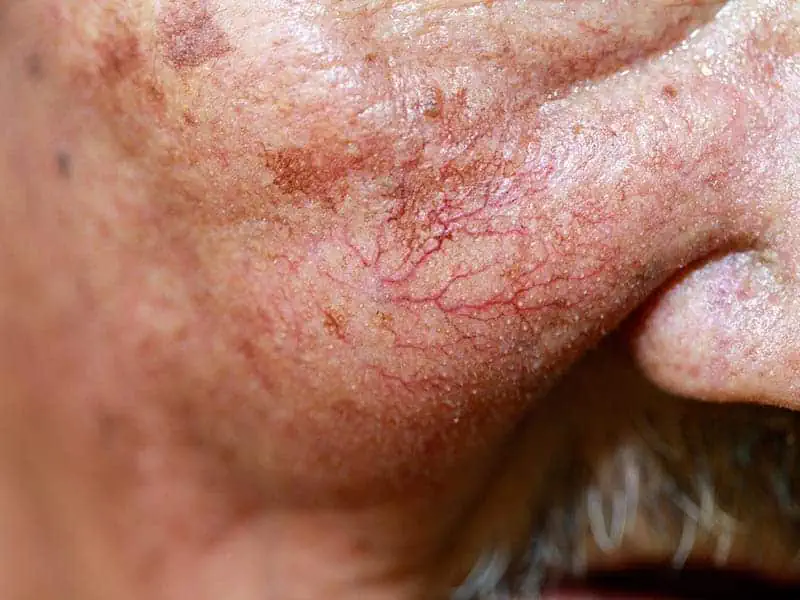
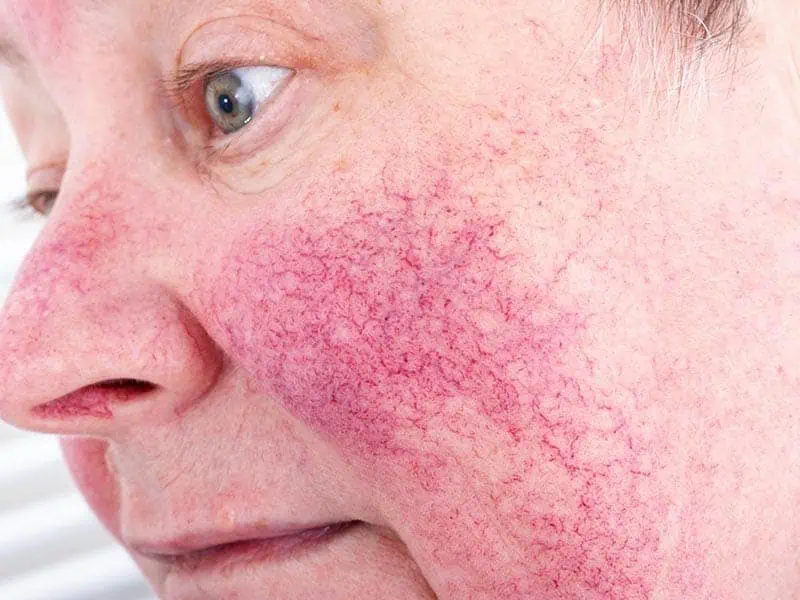
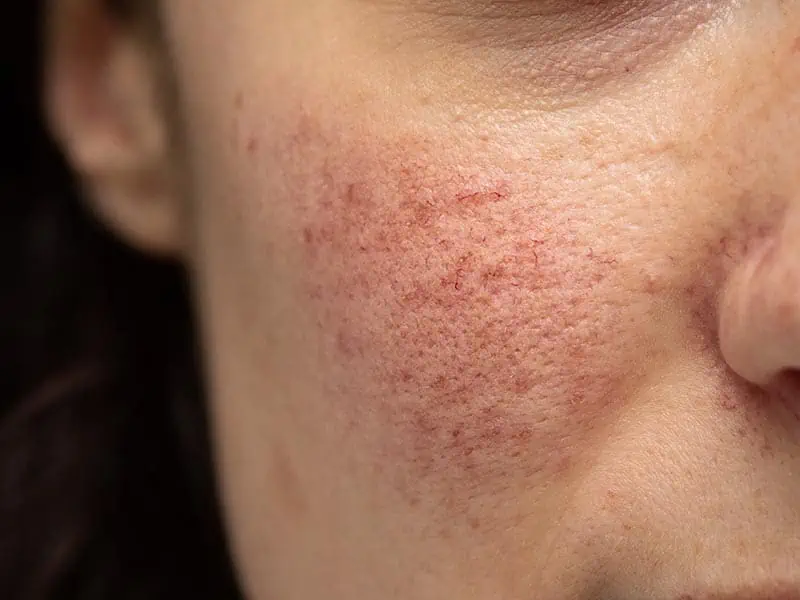
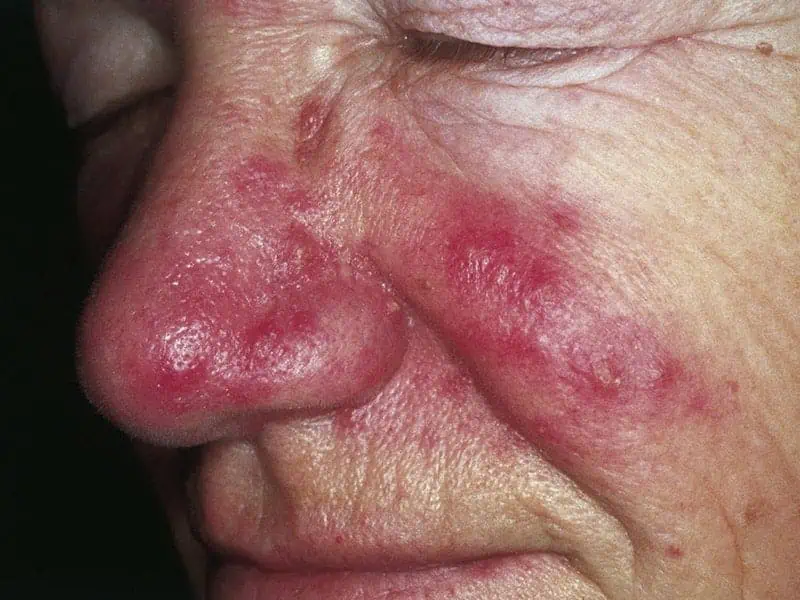
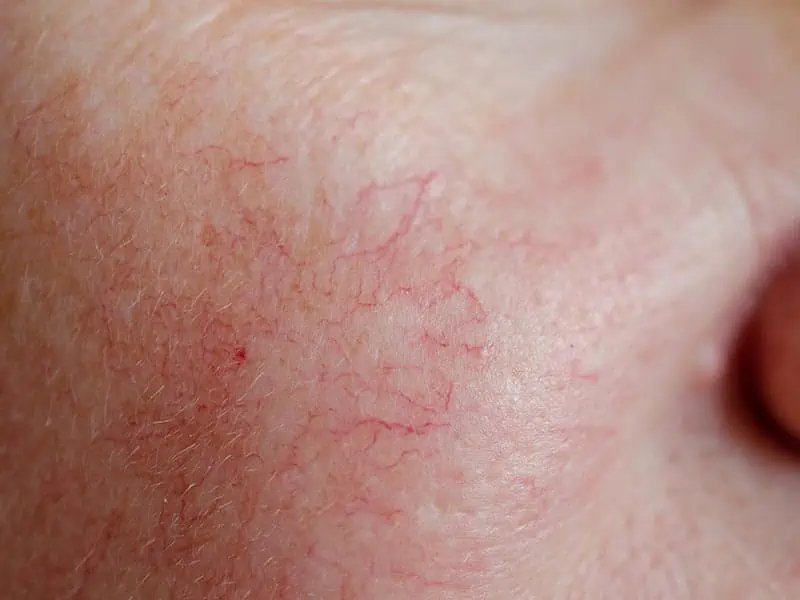
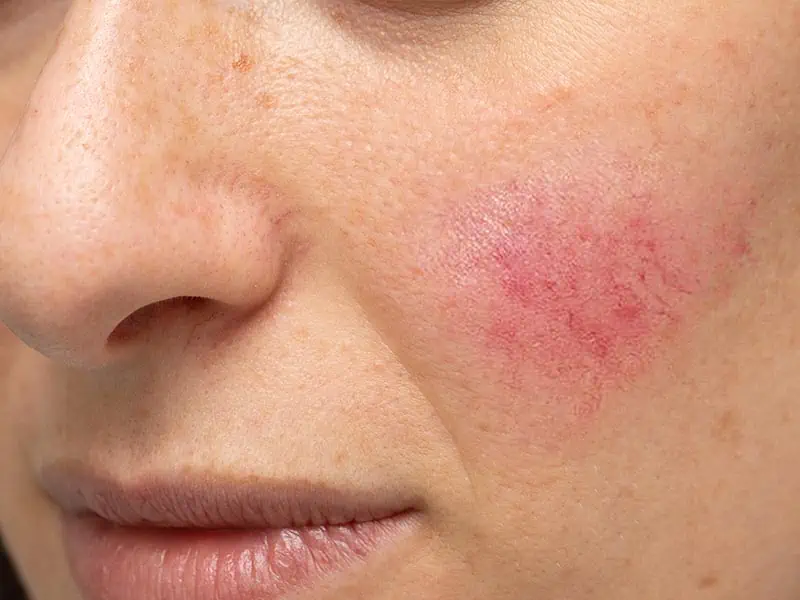
FREQUENTLY ASKED QUESTIONS
HOW CAN I MANAGE ROSACEA?
Management includes using products for sensitive skin; topical and / or oral products on prescription; and medical grade laser treatments to target the broken veins, redness and flushing.
You should also:
- Apply sun protection – use a product suitable for sensitive skin e.g. Skinceuticals mineral defense SPF 50 or Heliocare range.
- Avoid triggers – these are so variable, but rosacea sufferers know what exacerbates their symptoms.
WHAT ARE THE RISK FACTORS OF ROSACEA?
Anyone can develop rosacea, but you are more likely to suffer if:
- You are female
- You have light skin
- You have sun damaged skin
- You are over the age of 30
- You smoke
- There is a family history of rosacea
WHAT COMMONLY CAUSES FLARE-UPS IN ROSACEA?
- Hot drinks
- Spicy foods
- Cheese
- Caffeine
- Alcohol
- Exercise
- Stress
- Extreme temperatures
HOW MANY TREATMENTS WILL I NEED AND HOW OFTEN?
The number of treatments needed, will depend on the site and the extent of the affected area. Small veins on the face normally disperse just after 1-2 laser treatments at 6-week intervals. IPL may take 4 sessions at 2-week intervals.
DOES LASER TREATMENT FOR SPIDER VEINS AND ROSACEA HURT?
Depending on the type of light treatment used, some mild stinging or burning may be noticed during the procedure, and the area treated may feel hot for roughly 15 minutes after treatment. However, during treatment the skin is cooled, which reduces this stinging sensation and a cooling gel is applied afterwards.
WHAT COMMONLY CAUSES FLARE-UPS IN ROSACEA?
- Hot drinks
- Spicy foods
- Cheese
- Caffeine
- Alcohol
- Exercise
- Stress
- Extreme temperatures
HEAR FROM OUR PATIENTS
Start Your Journey With Us
Please fill in this form and one of our team will give you a call back to arrange a consultation with one of our expert dermatologists.
WHY TREAT YOUR ROSACEA AT THE HARLEY STREET DERMATOLOGY CLINIC?
Having the right dermatologist is important especially when you have a chronic skin condition that will require ongoing treatment. We want you to feel confident that we’re providing you with the best possible care. We also want you to feel as comfortable as possible with your dermatologist.
The Harley Street Dermatology Clinic specialises in conditions affecting the skin, hair and nails. Our goal is to provide all the care that you need when you’re experiencing these kinds of problems. We want to make it easy for you to access the best quality rosacea treatment London.
The clinic is conveniently located in Central London, so it’s easy to visit us if you need to see a dermatologist. You will find yourself in a very comfortable and welcoming environment. We have created a relaxing space where you will receive the highest quality of care. We are regulated by the Care Quality Commission, are part of the British Association of Dermatologists and are top rated by patients of Doctify so you can be sure of safe and effective treatment with us.
ROSACEA INSIGHTS AND ADVICE

Winter Skin Conditions
Winter weather can take a heavy toll on our skin. We are constantly stepping between the warm, heated rooms indoors and the cold, dry air outside. We also tend to wrap up more at this time of year, which can cause problems if clothes are

Should You Worry About Sun Damage in Winter?
Sun damage isn’t usually a problem in the UK in winter. The UV rays are not usually strong enough at this time of year to cause sunburn, but they can still affect your skin. Sun damage is responsible for many of the skin conditions treated
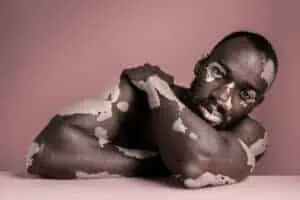
Are The Effects of Skin Conditions Underestimated?
Skin conditions can be embarrassing, uncomfortable and tricky to treat, but they are often dismissed as minor or cosmetic problems. It’s time we all took our skin more seriously.








